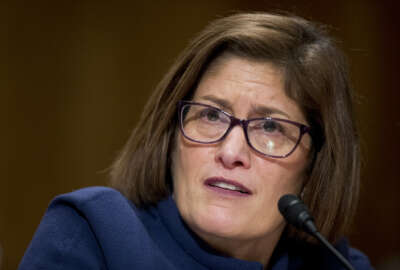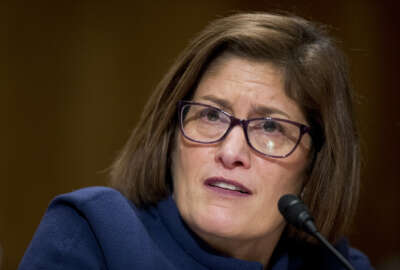
Justice Department seeks SCOTUS opinion on presidential appointments
The Department of Justice has petitioned the Supreme Court to hear a case that could impact presidential appointments and thousands of federal employees.
The Justice Department has asked the Supreme Court to weigh in on a Federal Vacancies Reform Act interpretation, which could have a far-reaching impact on presidential appointments.
Solicitor General Donald Verrilli Jr. filed a petition for a writ of certiorari on April 6 with the Supreme Court. The court has until May 9 to say whether or not it will hear the case, which gained attention earlier this year when the inspector general called into question the legality of Office of Personnel Management acting Director Beth Cobert’s service .
The court’s response could go one of several ways, but Cobert’s remaining time in office is not likely to be impacted, said Stephen Wermiel, a constitutional law professor at American University.
“There’s somebody out to fight with the government over anything that anybody thinks the government hasn’t done exactly properly,” Wermiel said. “I’m sure there are interested parties affected by her actions, but there are a lot of ‘ifs’ there. By the time the court decides this case, if it decides this case, she will no longer even be acting [director]. … Whether policy choices that she has made as the acting director will remain in place could be an effect of the Supreme Court deciding the case. But it could also be an effect of a new person working for a new President coming in to office and reversing the policies.”
At the heart of the petition is an August decision by the U.S. Court of Appeals for the D.C. Circuit in the case of SW General, Inc. v. National Labor Relations Board (NLRB).
In 2013, SW General called into question whether one of NLRB’s senior executives became ineligible to serve as acting General Counsel when the President nominated him to be General Counsel.
The court rejected NLRB’s argument, saying the acting officer section “applies to all acting officers and not just those officers who previously served as first assistants.”
Acting federal executives are generally limited to 210 days of service, according to the reform act, but this time can be extended “if they are formally nominated by the President to fill the position, in which case they may serve during the period that their nomination is pending in the Senate,” the OPM Office of Inspector General said in its memo.
But the IG also referenced the FVRA, which states a person may not serve as an acting officer for an office if they:
- Did not serve in the position of first assistant to the office of such officer.
- Served in the position of first assistant to the office of such officer for less than 90 days.
- The President submits a nomination of such person to the Senate for appointment to such office.
“Importantly, actions taken by persons serving in violation of the FVRA ‘shall have no force and effect,'” the IG said.
Cobert has held the acting director position since July 2015, when former OPM Director Katherine Archuleta resigned.
According to the December 2012 Plum Book, about 1,200 positions out of the roughly 4,000 presidential appointee positions require Senate confirmations.
Cobert’s issue first came to light in early February, when OPM Inspector General Patrick McFarland announced his resignation.
An OIG spokesperson told Federal News Radio in a February email that the violation was discovered when auditors began researching responsibilities under the act.
DoJ sought additional review from the court.
According to DoJ’s October petition seeking review, the court’s decision “repudiates a longstanding and consistent interpretation of the FVRA on which every President since its enactment has relied.”
In late January, the D.C. Circuit denied the petition.
Options for the justices
The Supreme Court could choose not to hear the case, meaning the lower court’s ruling stands, or the court could vacate and remand the case, Wermield said, meaning the justices “didn’t think the lower court was right, but they think the lower court needs to take another look.”
The court could also agree to hear the case.
“I think that the impact that this has on federal interim appointees and on Presidential power under this federal statute will not be lost on the court,” Wermiel said.
Eric Crusius, who represents government contractors at the law firm Miles & Stockbridge, pointed out the decision “impacts federal appointees across the government who are serving beyond terms permitted by the FVRA (or otherwise running afoul of the law),” including Cobert.
“If the Supreme Court declines to take the SW General case or takes the case and rules against the government, some or all of Cobert’s actions could be invalidated,” Crusius said.
Among the guidance issued to agencies under Cobert’s leadership are:
- Reforms in response to the executive order “Strengthening the Senior Executive Service”
- Recruitment, relocation and retention incentives
- Performance management guidelines for employee review at the end of fiscal 2015
- Direct hiring authority for certain agencies to combat the Zika virus
‘Lawfulness of nominees’
The Supreme Court gets up to 10,000 petitions every year, and only accepts about 1 percent of them.
“When the government is the petitioner, there’s a much higher rate of acceptance, but it’s not perfect,” Wermiel said. “The court doesn’t take every case in which the government is the petitioner, but it takes a much higher percentage. Normally, the odds of the case being heard when the Solicitor General is asking the court to hear it are fairly high.”
But with the death of Justice Antonin Scalia, an eight-justice court, and “the danger of dividing four to four … their pattern the last few weeks … seems to be granting fewer cases than usual,” Wermiel said.
OPM Press Secretary Sam Schumach said in a February statement that both the agency and administration were following DoJ’s view “on the lawfulness of nominees serving in an acting capacity.”
The White House shared similar sentiments earlier this year.
Cobert served as deputy director for management at the Office of Management and Budget. She joined OMB in October 2013 after a 29-year career as a consultant for McKinsey and Co.
Obama nominated Andrew Mayock, a senior adviser in the Office of the Director at OMB, to replace Cobert as deputy director for management at OMB.
OPM has been without a deputy director for more than three years. In August, Retired Rear Adm. Earl L. Gay, Obama’s nominee for deputy OPM director, withdrew his name from consideration after nearly a year waiting on Senate confirmation.
Gay was nominated to replace Christine Griffin, who left the agency in August 2011.
Copyright © 2025 Federal News Network. All rights reserved. This website is not intended for users located within the European Economic Area.





